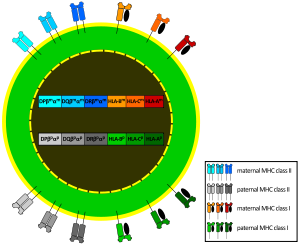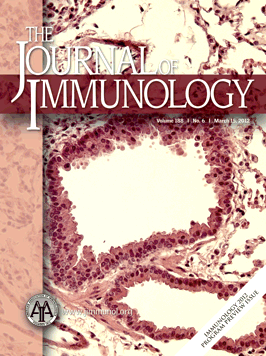导读:近日,中科院昆明动物研究所博士生戴正喜等在郑永唐指导下,首次发现,主要组织相容性复合物基因通过选择不同的剪接位点产生了一种新的存在形式,可调控免疫系统。该成果已发表于国际期刊《免疫学杂志》上。

据戴正喜介绍,目前普遍认为基因的选择性剪接即基因选择不同的剪接位点组合,是机体增加蛋白多样性的一种有效方式,也是机体调控蛋白表达的一种重要机制。在人类和灵长类动物中,保守估计约有75%的基因发生选择性剪接,尤其多发生在免疫系统。一个高效的免疫系统必须适时、适当地对病原微生物做出免疫应答。而免疫应答是机体免疫系统对抗原刺激所产生的以清除病源微生物为目的的生理过程。
“主要组织相容性复合物(MHC)是广泛存在于脊椎动物体内与免疫功能密切相关的一组基因群,其基因产物不仅参与移植排斥和T淋巴细胞的分化发育,在机体免疫应答的启动和免疫调节中也发挥重要作用。”戴正喜说,“许多研究表明,主要组织相容性复合物I类基因,在不同物种中均会发生不同程度的选择性剪接,产生新的剪接异构体。但几乎不清楚它怎样精细调控免疫系统。”
为探讨剪接异构体对全长型的MHC IA分子的影响及其在免疫调控中的作用,戴正喜等以人类近亲猕猴为模型动物,在猕猴外周血中具有单个核的细胞中发现和鉴定了一种新的剪接异构体。通过生物化学和分子生物学实验研究发现:这种新的剪接异构体可以表达于细胞膜表面,并且它的糖基化模式和蛋白降解速度与全长型的MHC IA分子明显不同。
更有趣的是,它们俩能在细胞内形成一种全新的异源二聚体结构。进一步研究还发现,此异源复合体能促进MHC IA蛋白的稳定性。这种新的顺式调控模式,为理解其对免疫应答的影响提供了一种全新视角。
该项研究获得国际专家高度认可,他们一致认为是主要组织相容性复合物剪接领域的一项重要进展。

The β2-Microglobulin–Free Heterodimerization of Rhesus Monkey MHC Class I A with Its Normally Spliced Variant Reduces the Ubiquitin-Dependent Degradation of MHC Class I A
Zheng-Xi Dai, Gao-Hong Zhang, Xi-He Zhang, Hou-Jun Xia, Shao-You Li, and Yong-Tang Zheng
The MHC class I (MHC I) molecules play a pivotal role in the regulation of immune responses by presenting antigenic peptides to CTLs and by regulating cytolytic activities of NK cells. In this article, we show that MHC I A in rhesus macaques can be alternatively spliced, generating a novel MHC I A isoform (termed “MHC I A-sv1”) devoid of α3 domain. Despite the absence of β2-microglobulin (β2m), the MHC I A-sv1 proteins reached the cell surface of K562-transfected cells as endoglycosidase H-sensitive glycoproteins that could form disulfide-bonded homodimers. Cycloheximide-based protein chase experiments showed that the MHC I A-sv1 proteins were more stable than the full-length MHC I A in transiently or stably transfected cell lines. Of particular interest, our studies demonstrated that MHC I A-sv1 could form β2m-free heterodimers with its full-length protein in mammalian cells. The formation of heterodimers was accompanied by a reduction in full-length MHC I A ubiquitination and consequent stabilization of the protein. Taken together, these results demonstrated that MHC I A-sv1 and MHC I A can form a novel heterodimeric complex as a result of the displacement of β2m and illustrated the relevance of regulated MHC I A protein degradation in the β2m-free heterodimerization-dependent control, which may have some implications for the MHC I A splice variant in the fine tuning of classical MHC I A/TCR and MHC I A/killer cell Ig-like receptor interactions.
文献链接:https://www.jimmunol.org/content/188/5/2285.abstract








